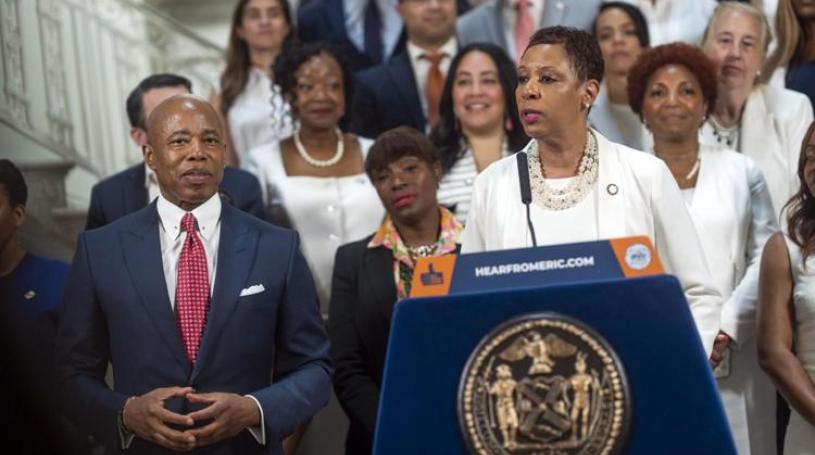Mayor, Council reach record budget deal
The city’s $107 billion budget for the 2024 fiscal year that took effect on July 1 is the largest ever approved by the City Council.
It had more than enough support, passing by final vote of 39-12, with the Council’s Progressive Caucus saying it does not spend enough on things like social service programs. Other critics said that it is pushing the city closer to a fiscal cliff with projected out-year deficits of nearly $20 billion over three years.
It marks a $6 billion increase over the budget approved in June 2022, though unanticipated revenue allowed for spending just short of $111 billion in the fiscal year that ended over the weekend.
The final version came in about $1 billion over Mayor Adams’ executive budget plan from April, and $5 billion higher than the preliminary one proposed in February.
Projected out-year deficits are $5 billion for fiscal year 2025, $6.8 billion for FY 2026 and $7.9 billion for 2027. The figures for FY 2025 and 2026 are slightly higher than those forecast by the mayor in January.
“We are proud to have reached a budget that makes strategic investments to keep our city safe and clean, and ensures working families have the services they need, while simultaneously maintaining strong reserves that will allow our city to be prepared for the future,” the mayor said in statement from his office “Despite myriad challenges and unexpected crises we have faced, I am proud to say we have successfully navigated these cross currents to arrive at a strong and fiscally responsible budget that will continue to ‘Get Stuff Done’ for New Yorkers.”
Councilmembers Tiffany Cabán (D-Astoria) and Jennifer Gutiérrez (D-Brooklyn, Queens) were the only two members of the Queens delegation to vote no.
The most noticeable increase is for the Department of Homeless Services, which has been slammed by the influx of unauthorized migrants and asylum seekers. The $4.1 billion budget is a marked increase over the $2.4 billion first approved for FY 2023.
Other details of the spending plan — all figures are compared to the number approved by the Council in June 2022 — include:
• $5.8 billion for the NYPD, an increase of $274 million over the initial 2023 allocation
• $31.49 billion for the Department of Eduction, an increase of $466 million;
• $2.3 billion for the FDNY, up from just under $2.29 billion;
• $579 million for the Department of Parks and Recreation, up from $562 million; and:
• $1.9 billion for the Department of Sanitation, increased from $1.87 billion.
“The Council’s focus in this budget has been to protect the essential services that the people of this city rely on to be healthy, safe, and successful,” Speaker Adrienne Adams (D-Jamaica) said in a press release last week. Adams said the Council was able to restore numerous proposed cuts to what she considers essential services and programs.
“This budget is an imperfect result of negotiation, but it reflects the efforts of this Council to deliver for the people of New York — to restore cuts to essential services like our libraries and our schools,” said Coucilwoman Selvena Brooks-Powers (D-Laurelton).
Brooks-Powers said It includes an expansion of the Fair Fares program and additional funding for senior care and secures $4 billion annually toward affordable housing as well as nearly $33 million for renovations of vacant NYCHA units.
Gutiérrez, in a press release sent to the Chronicle last week thanked the speaker and her negotiating team for holding the line on many cuts proposed by the administration.
“But I can not ignore the reality that my community is drowning in displacement, evictions, food insecurity, and childcare costs, and this budget leaves the city gasping for air,” she said. “... The Mayor’s budget fails our schools, our parents, our tenants, our unhoused, our seniors, our social service providers and it frames our economy of care as a question up for debate, rather than a requirement for our success.
Cabán was equally unimpressed in a tweet, citing “@NYCMayor’s attacks on working class New Yorkers’ health, safety, and economic security!”
Andrew Rein, president of the Citizens Budget Commission, also opposed many aspects of the budget, albeit for completely opposite reasons.
“The City’s leaders announced a fiscal year 2024 budget agreement that will please many stakeholders—for the next year,” Rein said in an email.
“It is essentially a one-year budget that again unfortunately delays the wise but hard choices needed to stabilize the City’s fiscal future,” he added. “With the coffers temporarily bulging, the budget increases fiscal cliffs, widens future budget gaps, and misses the opportunity to deposit money into the Rainy Day Fund.”
He said the city is funding many services and programs this year without dedicated funding beyond next June 30.
“The City should not wait until it slams into a fiscal wall to spend within its means,” Rein said. “It should prioritize programs, reduce spending on those with lower impact, and restructure operations to increase productivity.”
Rein credited Mayor Adams for many reductions and savings programs.
“Thus far this has mostly been pruning low-hanging fruit,” he said “Furthermore, collective bargaining agreements failed to include productivity savings to offset their costs.”
Rein said the administration, Council, and the municipal unions must collaborate to ensure the city can deliver to New Yorkers what cost savings. .
“This burgeoning habit of funding major programs one year at a time is effectively putting the budget dance of years’ past on steroids, potentially creating massive annual service crises.

